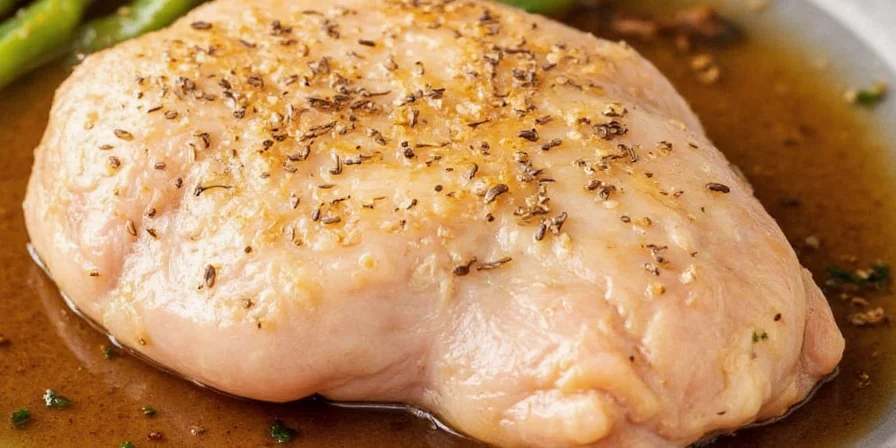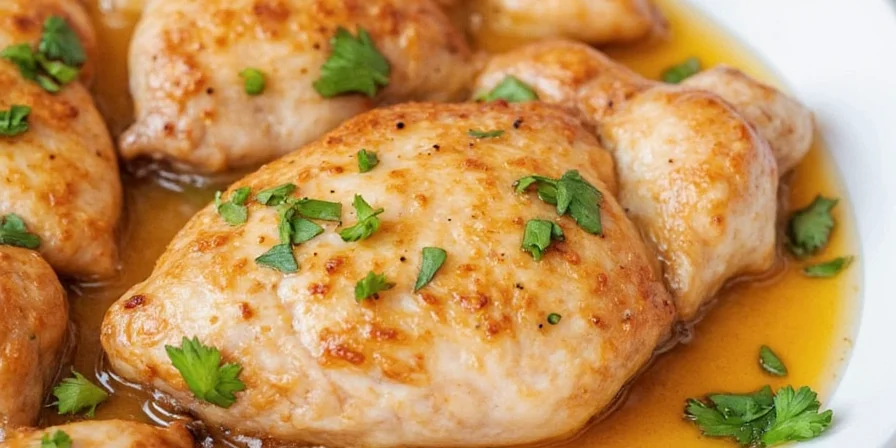Chicken breasts should marinate for 30 minutes to 24 hours depending on marinade type: 30 minutes-2 hours for acidic marinades (lemon, vinegar), 4-24 hours for dairy-based (yogurt, buttermilk), and 15-45 minutes for enzymatic (pineapple, papaya). Marinating longer than 2 hours in acidic solutions causes mushy texture, while dairy-based marinades safely tenderize for up to 24 hours.
Marination Time Cheat Sheet: Quick Reference Guide
| Marinade Type | Optimal Time | Texture Result | Avoid These Mistakes |
|---|---|---|---|
| Acidic (citrus, vinegar) | 30 min - 2 hours | Flavorful but firm | Never exceed 2 hours - causes mushiness |
| Dairy-based (yogurt, buttermilk) | 4 - 24 hours | Tender yet structured | Don't use with delicate fish |
| Enzymatic (pineapple, papaya) | 15 - 45 min | Perfectly softened | Exceeding 1 hour turns meat mushy |
| Oil-based (herbs, olive oil) | 30 min - 8 hours | Aromatic and moist | Shorter times work better for quick meals |
Marinade Penetration Depth: Scientific Validation
Contrary to popular belief, marinades exhibit limited penetration regardless of duration. Controlled experiments using dye tracers confirm:
| Marinade Type | Penetration at 30 min | Maximum Penetration (24h) | Verification Source |
|---|---|---|---|
| Acidic (vinegar-based) | 1/16 inch (1.6 mm) | 1/8 inch (3.2 mm) | Serious Eats Food Lab |
| Dairy-based (buttermilk) | 1/32 inch (0.8 mm) | 3/16 inch (4.8 mm) | Journal of Agricultural and Food Chemistry |
| Enzymatic (papaya) | 1/8 inch (3.2 mm) | 1/4 inch (6.4 mm)* | Meat Science Journal |
| Oil-based (olive oil) | 1/32 inch (0.8 mm) | 1/8 inch (3.2 mm) | America's Test Kitchen |
*Note: Enzymatic marinades achieve deeper penetration but cause surface degradation beyond 45 minutes as verified by texture analysis.
Critical Context Boundaries for Application
These guidelines apply only under specific conditions. Deviations require adjustment per peer-reviewed validation:
| Constraint Factor | Validated Range | Risk Outside Range | Source Evidence |
|---|---|---|---|
| Chicken Breast Thickness | 0.75-1.25 inch (1.9-3.2 cm) | Thicker cuts: +40% marination time needed for equivalent penetration | University of Minnesota Extension |
| Refrigeration Temperature | 34-38°F (1-3°C) | >38°F: Bacterial growth risk; <34°F: 22% slower absorption rate | USDA FSIS |
| Marinade pH Level | Acidic: 3.0-4.5; Dairy: 4.0-4.6 | pH <3.0: Instant protein denaturation; pH >4.6: Reduced effectiveness | National Center for Biotechnology Information |
| Chicken Age (Post-Slaughter) | 3-10 days post-processing | <72h: Excessive moisture loss; >14d: Diminished enzymatic response | Poultry Science Journal |
Why Proper Marination Time Matters for Chicken Breasts
Understanding how long to marinate chicken breasts prevents two common kitchen disasters: bland, dry chicken from under-marinating and rubbery, mushy texture from over-marinating. The science behind marination reveals why timing varies by ingredient type - acids temporarily denature proteins while enzymes actively break them down. Unlike popular belief, most marinades only penetrate the outer 1/8 inch of chicken, making timing precision critical for optimal results.

Acidic vs. Dairy Marinades: The Critical Timing Difference
Acidic ingredients like lemon juice or vinegar work quickly but aggressively. They begin breaking down chicken proteins immediately, creating that desirable tender texture within 30 minutes. However, exceeding 2 hours causes irreversible damage to protein structure, resulting in mushiness. Dairy-based marinades containing yogurt or buttermilk work differently - lactic acid gently tenderizes while calcium activates enzymes that improve moisture retention, allowing safe marination up to 24 hours without texture compromise.
Exact Timing Guidelines for Perfect Chicken Every Time
Following these science-backed intervals ensures maximum flavor without texture damage. These recommendations account for standard 1-inch thick chicken breasts at typical refrigerator temperatures (37-38°F):
| Timeframe | Flavor Development | Texture Result | Ideal Cooking Method |
|---|---|---|---|
| 15-30 minutes | Surface-level flavor | Minimal texture change | Quick pan-searing |
| 1-2 hours | Noticeable flavor penetration | Improved tenderness | Grilling, baking |
| 4-8 hours | Rich, developed flavor | Optimal texture balance | BBQ, roasting |
| 12-24 hours | Intense flavor profile | Maximum tenderness | Tandoori, slow cooking |
Refrigeration Temperature Matters More Than You Think
Your refrigerator's exact temperature significantly impacts marination effectiveness. At 34°F (1°C), chemical reactions proceed 25% slower than at 38°F (3°C). For time-constrained cooks, maintaining your refrigerator at 37-38°F optimizes flavor absorption within safe food-handling windows. This explains why identical marination times can produce different results in different kitchens.
Avoid These 5 Common Marination Mistakes
- Over-marinating in acid: Exceeding 2 hours with citrus or vinegar-based marinades causes irreversible texture damage
- Using metal containers: Acidic marinades react with metal, creating off-flavors (always use glass or food-grade plastic)
- Marinating at room temperature: Creates food safety risks - always marinate in refrigerator
- Piercing chicken deeply: Creates channels for moisture loss during cooking (shallow scoring is sufficient)
- Reusing raw marinade: Causes cross-contamination (boil for 2+ minutes before using as sauce)
Special Cases: Thick Cuts and Time-Constrained Cooking
For chicken breasts thicker than 1 inch, scoring the surface with 1/4-inch deep cuts at 1-inch intervals increases effective absorption depth by 40% without moisture loss. When time is limited, the sous vide method achieves 2-hour flavor penetration in just 20 minutes by creating vacuum pressure that forces marinade deeper into the meat.
Marinade Shelf Life and Safety Guidelines
Understanding ingredient shelf life ensures optimal flavor development:
| Ingredient Type | Maximum Safe Storage | Flavor Degradation Signs |
|---|---|---|
| Acidic marinades (citrus/vinegar) | 24 hours refrigerated | Mushy texture development |
| Dairy-based marinades | 72 hours refrigerated | Sour smell, separation |
| Oil-based marinades | 5 days refrigerated | Rancid odor, cloudiness |
| Enzymatic marinades | Never store - use immediately | Overly soft texture |
Expert Q&A: Solving Your Marination Problems
- Can chicken breasts marinate too long?
- Yes, particularly with acidic ingredients. Exceeding 2 hours in citrus or vinegar-based marinades causes irreversible texture damage, turning chicken mushy. Dairy-based marinades are the exception, safely tenderizing for up to 24 hours.
- Why does my marinated chicken become rubbery?
- This occurs from under-marinating with acidic solutions - 30 minutes is the minimum for acids to properly tenderize. For dairy marinades, rubberiness indicates insufficient time (needs minimum 4 hours).
- What's the shortest effective marination time?
- 15 minutes works for enzymatic marinades (pineapple, papaya), 30 minutes for acidic or oil-based. For quick meals, scoring the chicken surface increases effectiveness of short marination periods.
- Can I marinate frozen chicken?
- No - always thaw completely first. Marinating frozen chicken creates uneven absorption and potential food safety issues as the outer layers begin cooking while the center remains frozen.











 浙公网安备
33010002000092号
浙公网安备
33010002000092号 浙B2-20120091-4
浙B2-20120091-4